Don't Leave Your New Home Purchase to Chance. Make the Most of Your Home Inspection—the Most Critical Step Before Buying a House.
When buying a new home, whether it's a permanent residence or investment property, the inspection may very well be the most crucial step in the entire transaction.
It serves as your singular opportunity to have a professional gauge the home's overall condition, including it's structural, mechanical, electrical, and plumbing systems. More importantly, an inspection stands as the most significant step in determining if you should move forward with the purchase, seek repairs or concessions, or cancel the deal.
With so much on the line, it's essential you take advantage of the opportunity an inspection presents to familiarize yourself with your future home.
Let's explore five tips for making the most of your home inspection.
1. Make Your Inspection Part of the Contingency
When agreeing to the initial purchase terms, work with your realtor to ensure the inclusion of an inspection contingency in the contract. This clause allows you as the buyer time to have the home professionally inspected (usually between 10 to 14 days). It also enables you to step away from the deal—and with your earnest money should the inspection reveal too many issues or repair negotiations fall through.
2. Conduct Your Own Inspection
Consider for a moment how many times you tour your would-be home before the closing date. If you're like most, the answer is around two to three visits. Not much considering the size of the purchase.
Most beneficial prior to the professional inspection, schedule a time to conduct a thorough walkthrough of the house yourself. Flip on all the lights. Turn on all the faucets. Flush all the toilets. Check under cabinets and along molding and baseboards for signs of current or past leaks.
Familiarizing yourself early gives you greater knowledge and confidence heading into the professional assessment. For a more successful pre-inspection, bring along a trusted friend or family member with an observant set of eyes to help you spot potential problems.
3. Pick the Right Inspector
Although a trusted real estate professional will have plenty of home inspection contacts to offer you, it's worth your time to conduct a search of your own. Seek out referrals and research well regarding inspectors who've proven their worth with previous clients. It's especially helpful if you can identify those that specialize in the type of luxury home you plan on purchasing.
Similar to your real estate professional, finding your own inspector will pair you with someone you trust. An individual who will offer their frank assessment of a home's good and not so good qualities.
4. Show Up
Arguably, the most critical factor in making the most of your home inspection is showing up for it. Too often, home buyers consider the inspection a cursory step on the way to closing the deal. They leave the details to be sorted out by the realtor and inspector.
Considering the size of the investment, you should very much want to involve yourself in the process. First, being present helps to further your knowledge about the property. While your pre-inspection helped you uncover cosmetic or surface-level concerns, the professional inspection takes it a few steps further.
While we suggest allowing your inspector the space to do the job you hired them for, don't hesitate to ask questions—lots of them. This home, after all, is your investment, made with your money. The best inspectors are patient with their clients and will gladly answer whatever concerns you may have.
5. Decide What's Important and Request Documentation
Based on what the inspection uncovers, you'll have some decisions to make when taking those findings to the negotiation table. For any deficiencies, the process allows you to ask the seller to repair a concern on their dime or provide a credit towards the purchase price.
As a rule, you'll want to negotiate terms for any problems related to safety or significant structural or mechanical shortcomings. Items that might impact your ability to secure the home loan or insurance. However, don't sink a deal for a great home over minor cosmetic issues. Work with your real estate professional to find high-quality repair services for minor items.
If you're at an impasse, a home warranty is always a viable option for the seller to include in the deal. If the seller does coordinate certain repairs, ensure you receive detailed documentation for proof of satisfactory completion.
Ready to sell your current home or in the market to buy and make your next major move?
Contact Prema Subramaniam today and let her be your guide to East Bay luxury homes in Danville, Dublin, and Fremont, California.
